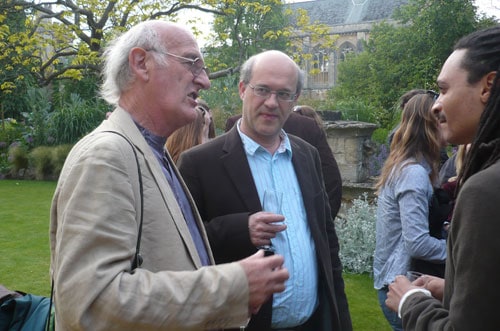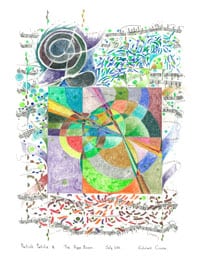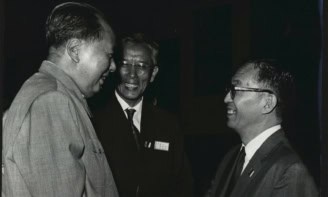
Edward Cowie, left, after yesterday’s world première of Particle Partita.
By Matin Durrani
“I loved it, I really loved it.”
So said one guy to me on the lawns of Balliol College, Oxford, at the drinks reception that followed yesterday’s world première of what was dubbed “a ground-breaking arts–science collaboration themed around the elementary particles”.
The event was a one-hour scientific “performance–lecture” presented by Oxford University particle physicist Brian Foster and the Brit Award-winning violinist Jack Liebeck, in which the pair linked the ideas of particle physics with music.
The concept was simple. Foster presented a bite-sized history of particle physics in eight parts, all the way from Democritus’s idea of atoms right up to the current hunt for the Higgs boson at CERN’s Large Hadron Collider. At the end of each part, Liebeck performed music specially written by the physicist, artist and composer Edward Cowie, with each of these eight short pieces reflecting – and being inspired by – the concepts just discussed by Foster.
Entitled Particle Partita, Cowie dubs the work “a sonic ‘history’ of particle physics” that follows the “ornate and beautiful actions and reactions” of particles’ charge, spin and symmetry. “It is a music of great complexity with many materials that re-emerge in altered but related forms from the opening to the close,” muses Cowie in the programme notes. Cowie also created special drawings for each piece that were displayed on a screen as Liebeck played in Oxford’s beautiful Holywell Music Room.

The last of the eight pieces was a duet in which Liebeck was joined by Foster to perform “The Higgs boson – and beyond?”.
Foster and Liebeck are not, of course, new to the world of art–science collaborations, having been entertaining audiences for more than five years with their lectures Superstrings and Einstein’s Universe. Cowie, meanwhile, also collaborated with Bristol University’s Michael Berry in writing Rutherford’s Lights, a work for solo piano created as a homage to Ernest Rutherford.
Speaking in an interview with Physics World in 2010, Cowie wryly noted that many arts–science collaborations are “unholy marriages”. At turns sparse, dramatic and violent, the music of Particle Partita is certainly demanding of the listener, with Cowie himself admitting to me as we made our way in to yesterday’s first public performance that the music is “challenging”. One audience member, meanwhile, was overheard to say that the lecture went “right over my head”.
Particle Partita was commissioned with funds from the University of Oxford, the Alexander von Humboldt Foundation and the Institute of Physics, which publishes physicsworld.com. You can get a special, behind-the-scenes look at the making of the piece in this video we filmed last year.



